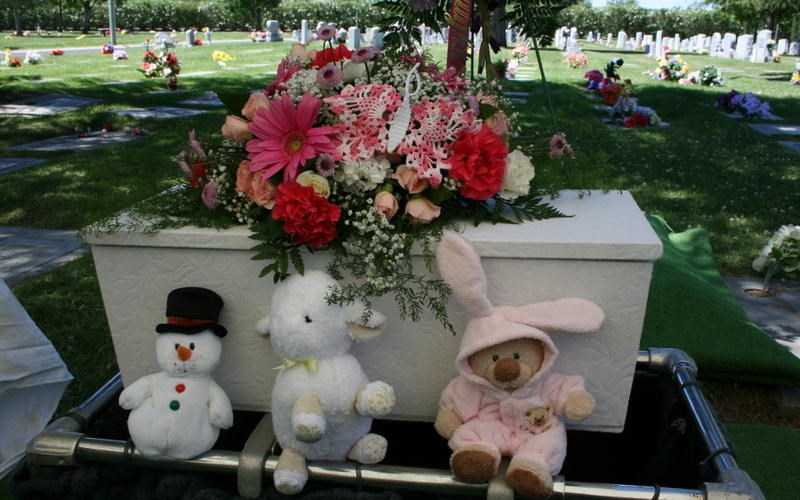

This is far from an academic question. Couples tragically lose children through miscarriages (my wife and I experienced five miscarriages before our first child was born), through stillbirth, and through illness and accidents that occur in early childhood. Some children are taken through abortion, and both the mother and father in such abortions may one day come to regret what they did, repent of it, and seek forgiveness. And then the question may arise in their hearts: what happened to the child? Where did he go when he died?
While we certainly might wish there was more information on this matter in Scripture, there is enough to give us a sense of assurance about the eternal destination of children who die early.
Perhaps the clearest passage concerns David and the son he conceived in his adulterous liaison with Bathsheba (2 Samuel 12:15-23). The child became deathly ill almost the moment he was born, and despite David’s desperate intercession (“[he] fasted and went in and lay all night on the ground”), the boy died after just seven days of life.
After David received the news, he rose from the ground, washed himself, ate, and “went into the house of the Lord and worshiped.” David explained to his servants, “While the child was alive, I fasted and wept, for I said, ‘Who knows whether the Lord will be gracious to me, that the child may live?’ But now he is dead. Why should I fast? Can I bring him back again? I shall go to him, but he shall not return to me” (2 Samuel 12:22-23).
In other words, David is saying, when I die, I will go to where my son is. I will see him and be reunited with him. Well, where did David, the man after God’s own heart, go when he died? He went into heaven, into the presence of God. And he declares that he would find his son waiting for him there. Perhaps it was with this news that “David comforted his wife Bathsheba” (2 Samuel 12:24).
This is a powerful indication that children who die in the womb or in infancy go into the presence of God, where they will be waiting for us to join them. By God’s grace, may many parents be comforted with this hope in our day as David was in his.
“Surrendering the Secret” is a ministry to post-abortive women to help them recover from the grief and the guilt they experience once they come to terms with what they have done. One component of the healing process involves these women going quietly before God and asking him to reveal to them, if he chooses, the name of the child whom they aborted and who is now with Him.
These women then paint the name of the child on a stone, which they place in a secluded place along with other stones from other mothers. Behind a pro-life pregnancy center in Tupelo, MS, for instance, is a little memorial garden filled with just such stones.
When talking about where children go when they die, questions about the age of accountability flow naturally from the conversation. Again, while we certainly could wish for more information on this topic, the Bible is clear enough to give us some definitive answers.
That there is an “age of accountability” is evident from a very famous passage in Scripture found in Isaiah 7:14-16. Isaiah there reveals a prophetic word he had been given about a son who would be born to a virgin who would be called by the name “Immanuel.”
This is one of the many prophecies in Scripture which contain a dual fulfillment, one near and the other further off. Isaiah is speaking initially of a child who would be born in his own day, but that child in turn would picture the Messiah who was to come. Of the child who was to be born in his day, Isaiah says (emphasis mine), “He shall eat curds and honey when he knows how to refuse the evil and choose the good. For before the boy knows how to refuse the evil and choose the good, the land whose two kings you dread will be deserted” (Isaiah 7:15-16).
There was, then, a time in this young boy’s life when he was not old enough to know how to refuse evil and choose good. But as he grew, he reached the point where did know how to refuse evil and choose good. In other words, prior to the “age of accountability” he did not have the capacity of moral discernment. But after the age of accountability, he did.
Where exactly this age of accountability falls the Scripture does not say. But it is clear that as children reach the age of five or six their capacity to absorb and understand moral and spiritual truth has grown significantly. I placed my faith in Christ as a five year old, at my father’s knee, and I distinctly remembering knowing, even at that age, that I was a sinner who needed a Savior.
My own children were also about the same age when they first placed their faith in Christ.
Our culture even today may contain a dim reflection of this concept since we typically first send children off to begin their formal education at age five or six. They are now old enough, we recognize, to receive instruction and to be held accountable (through testing) for what they have been taught.
In the Jewish culture in which Jesus grew up, boys went through what today is called a “bar mitzvah” at age 12. (“Bar mitzvah” literally means “a son of the law.”) At age 12, a boy was no longer to be considered a boy but a young man, who now had responsibility to make mature decisions and be held accountable for his own behavior. Before age 12, his parents were held accountable for his behavior, but from age 12 and on he was to accept full responsibility for his own decisions.
This is why Jesus was in the Temple at age 12, “sitting among the teachers, listening to them and asking them questions” (Luke 2:46). Every adult male had a responsibility to be in Jerusalem for the major feasts, and Jesus was now regarded, at age 12, as an adult male with adult responsibilities.
The Scripture indicates clearly that there is an age of accountability. This means that we as parents have the sobering responsibility to bring our children up “in the discipline and instruction of the Lord” (Ephesians 6:4) so that they are prepared for the responsibilities and challenges of adulthood.
So as a final word, there does seem to be a clear witness of Scripture that children who die before the age of accountability go directly into God’s presence. To be sure, they are received there not because they deserve it, since we all are conceived in sin (Psalm 51:5), but because God is merciful and gracious.
May those who have lost children take great comfort in these words.

